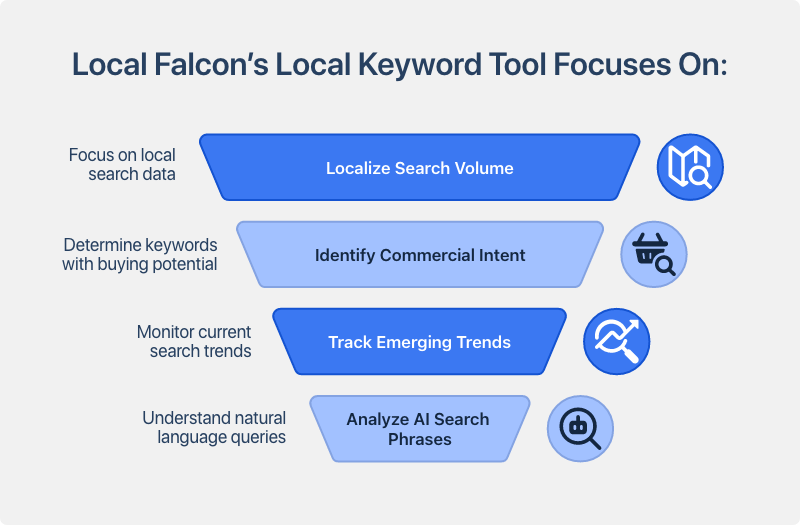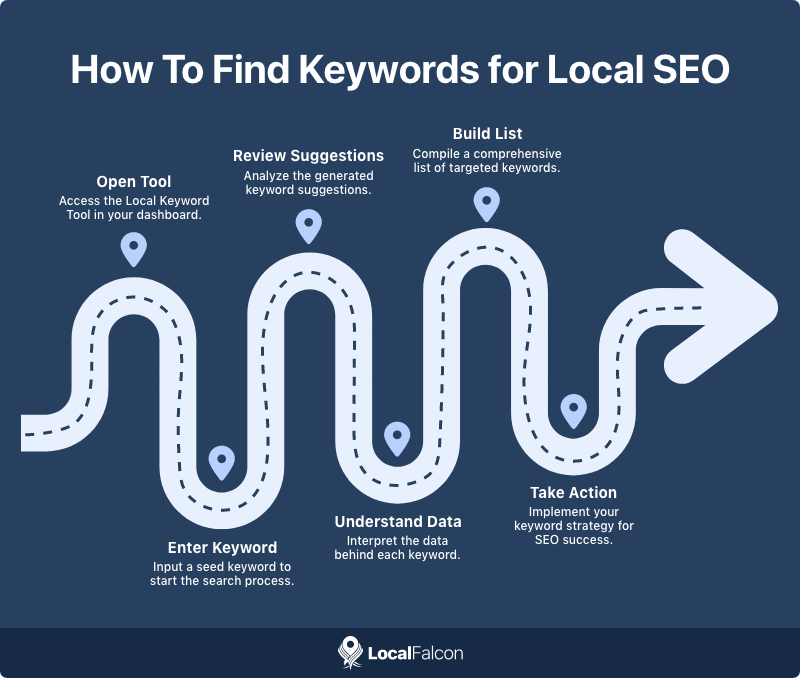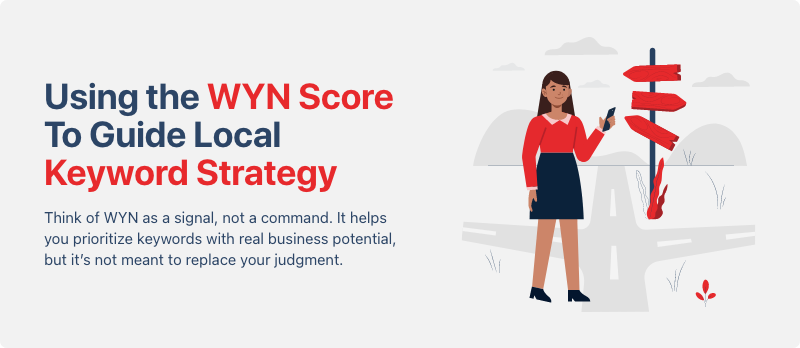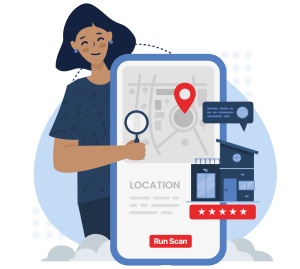Local keyword research requires a different approach than traditional SEO keyword research. Trying to rank for broad, high-volume, ultra-competitive terms as a local business is an uphill battle. If you're trying to stand out in a specific city, neighborhood, or service area, you need to target more specific, locally relevant keywords.
But until now, keyword research tools haven't done much to address that. Most keyword tools still rely on national-level metrics. This is fine for getting general keyword ideas, but it doesn't tell you exactly what search phrases real people in your market are using right now to discover businesses like yours.
That's where Local Falcon's AI-powered Local Keyword Tool comes in. Unlike generic keyword tools that use national data and outdated metrics, this tool is built for local SEO from the ground up. It combines traditional search data with AI reasoning, a proprietary Weighted Yield Number (WYN) score to measure business value (think of it as how much you stand to win by targeting that keyword), and insight into both traditional SEO and AI search phrases. Even better, it's fully integrated into your Local Falcon dashboard and free to use for all users.
This guide will walk you through how to find keywords for local SEO step by step and explain the unique data points that make Local Falcon's Local Keyword Tool one of the most powerful ways to build a winning keyword strategy for your local market.
Why Generic Keyword Research Falls Short (Especially in the AI Era)
Most keyword tools are designed for national or global search campaigns. They tell you what people are searching for in aggregate, but they don't reflect your local reality.
For example, a keyword like "family dentist" might have massive national volume, but if you're a dentist with a single office in Seattle, you need to know which variations, like "family dentist downtown Seattle" or "emergency dental near Capitol Hill," are actually worth targeting.
Not only that, but you need to understand how to find local keywords that people are using for AI search, which tend to be much longer and more naturally-phrased than the keywords that generic keyword research tools spit out.
Local Falcon's Local Keyword Tool focuses on:
- Localized search volume and competition instead of national data.
- Commercial intent, not just popularity.
- Emerging search trends, so you don't waste time on terms losing relevance.
- AI-style search phrases that reflect how people speak to tools like ChatGPT or trigger Google AI Overviews.

How To Find Keywords for Local SEO: Step-by-Step
Step 1: Open the Local Keyword Tool in Your Local Falcon Dashboard
Log into your Local Falcon account and find "Local Keyword Tool" in the left-hand navigation.
From here, you can either:
- Select a saved business location from your dashboard, or
- Manually enter a location, such as a city, state, or address, if you're researching a new area.
This ensures every keyword suggestion is tied to a specific market, rather than generic data pulled from somewhere else.
Step 2: Enter a Seed Keyword
The tool will suggest a starting keyword based on your business category if you've selected a saved location, but you can type in anything you want. Examples:
- A broad service term like "landscaping"
- A niche product like "hardwood flooring"
- A local modifier like "catering Toronto"
Then, just click "Get Keywords" and let the tool generate tailored local keyword recommendations!
Step 3: Review Your Local Keyword Suggestions
In seconds, you'll see two keyword lists side-by-side:
- Traditional Search Keywords: Short-tail and long-tail local keywords used for traditional search engines like Google and Bing.
- AI Search Phrases: Natural-language, conversational queries used to prompt AI search tools and trigger AI-generated summaries, like Google's AI Overviews.
Step 4: Understand the Data Behind Each Keyword
Every keyword suggestion comes with multiple layers of AI-driven insight:
- AI-Generated Reasoning
Hover over any keyword to see why the Local Keyword Tool recommends it. The tool explains how it relates to your business, market, and intent, giving you context you can't get from a raw keyword list.
- Keyword Intent
Each keyword is labeled as informational, navigational, commercial, or transactional. This tells you whether the searcher is just browsing, looking for a specific business, comparing options, or ready to buy.
- WYN Score
This proprietary metric ranges from 1-100 and measures the actual business value of a keyword in your market (the higher the score, the more potential value it has). Unlike generic tools that only look at national keyword volume and difficulty, WYN factors in:
- Localized search volume and competition
- Commercial intent (how action-oriented the term is)
- Trend and seasonality data
Higher WYN scores signal keywords that can realistically drive calls, visits, or sales, instead of just impressions and clicks.
- Standard Local Keyword SEO Metrics
You'll still see familiar data points like search volume and keyword difficulty, giving you a complete picture to work from.
Step 5: Build Your Keyword List
Click the "+" icon next to any keyword to add it to your list in the sidebar. You can repeat the process with different seed keywords or locations to build a comprehensive set of terms.
As you do this, you're not just collecting keywords, you're building a strategy backed by real-world data. Consider things like:
- Which terms have strong commercial or transactional intent?
- Which ones are rising in local popularity?
- Which ones will be hardest to rank for?
And remember, the WYN score takes all of these different factors into account for you, making your job easier than ever!
Step 6: Turn Your Keywords Into Action
Once you've selected the terms you want to target, you can instantly:
- Run a Quick Scan to see where you rank today for those keywords.
- Create a Campaign Scan to monitor ongoing performance and track improvements over time.
This seamless workflow means you don't have to export data, switch tools, or guess at what to do next. You can go from keyword discovery to actionable local SEO strategy in minutes.

Using the WYN Score To Guide Local Keyword Strategy
Think of WYN as a signal, not a command. It helps you prioritize keywords with real business potential, but it's not meant to replace your judgment.
For example, if you run a breakfast restaurant in NYC, "breakfast NYC" may have a huge search volume but a low WYN score because competition is overwhelming. Meanwhile, "brunch near Central Park Midtown" might have a higher WYN score because it's more specific and action-oriented.
The next step would be to run a geo-grid scan in Local Falcon to confirm whether you can realistically rank for it. That's how you validate opportunities before you invest time and effort.

How To Find Keywords for Local SEO in the Age of AI Search
While traditional local search traffic still accounts for the majority of traffic, people are no longer only typing short, robotic queries into Google. They're asking natural-language questions, both in AI tools like ChatGPT and in traditional search, triggering AI-generated summaries like Google AI Overviews.
That's why the Local Keyword Tool delivers AI-style search phrases alongside traditional SEO keywords. Optimizing for both helps you future-proof your strategy and make sure your business shows up no matter how your potential customers are searching.
Final Thoughts: The Fastest Way to Build a Smarter Local Keyword Strategy
Local Falcon's Local Keyword Tool gives you everything you need to:
- Find hyper-local keywords that matter.
- Understand why they matter with AI-generated reasoning.
- Prioritize local keywords with WYN scores, search intent, and traditional metrics.
- Launch local rank tracking scans and campaigns instantly to validate and track your efforts.
- Optimize for both search engines and AI platforms, all from one dashboard.
Stop wasting time with generic keyword research. Start using Local Falcon's Local Keyword Tool now to uncover opportunities in your market, build smarter local SEO campaigns, and stay ahead of how people are searching today and how they'll be searching tomorrow!


